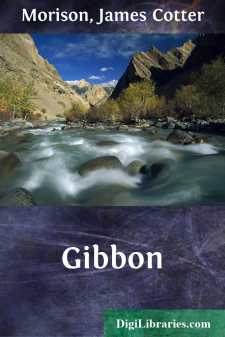History
- Africa 30
- Americas (North Central South West Indies) 50
- Ancient 68
- Asia 58
- Australia & New Zealand 8
- Canada 41
- Caribbean & West Indies 1
- Civilization 20
- Eastern Europe 12
- Europe 310
- Expeditions & Discoveries 60
- General 77
- Historical Geography 1
- Jewish 9
- Latin America 3
- Medieval 8
- Middle East 13
- Military 248
- Revolutionary 8
- Study & Teaching 5
- United States 353
- Western Europe 56
- World 13
History Books
Sort by:
THOUGHTS ON HISTORY I do not propose in this paper to enter into any general inquiry about the best method of writing history. Such inquiries appear to me to be of no real value, for there are many different kinds of history which should be written in many different ways. A diplomatic, a military, or a parliamentary history, dealing with a short period or a particular episode, must evidently be treated...
more...
by:
George Arbuthnot
CHAPTER I. Object of Travels—Start—Mad Woman—Italian Patriot—Zara—Sebenico—Falls of Kerka—Dalmatian Boatmen—French Policy and Austrian Prospects—Spalatro—Palace of Diocletian—Lissa—Naval Action—Gravosa—Ragusa—Dalmatian Hotel—Change of Plans. 'Omer Pacha will proceed with the army of Roumelia to quell the disturbance in Herzegovina.' Such, I believe, was the...
more...
CHAPTER I SHEPHERDS ON THE BORDER OF THE DESERT Ancient Arabia is the home of that branch of the white race known as the Semitic. Here on the fertile fringes of well-watered land surrounding the great central desert lived the Phœnicians, the Assyrians, the Babylonians, and the Canaanites who, before the Hebrews, inhabited Palestine. So little intermixing of races has there been that the Arabs of...
more...
INTRODUCTION (The Planting of the First Colonies) After the discoverers and explorers of the sixteenth century came (chiefly in the seventeenth) the founders of settlements that grew into States—French Huguenots in Florida and Carolina; Spaniards in St. Augustine; English Protestants in Virginia and Massachusetts; Dutch and English in New York; Swedes in New Jersey and Delaware; Catholic English in...
more...
INTRODUCTION (Voyages of Discovery and Early Explorations.) Schoolboys have been taught from their earliest years that Columbus discovered America. Few events in prehistoric times seem more probable now than that Columbus was not the first to discover it. The importance of his achievement over that of others lay in his own faith in his success, in his definiteness of purpose, and in the fact that he...
more...
CHAPTER I BACKGROUNDS In 1862, less than a year after he had assumed his post in London, the American Minister, Charles Francis Adams, at a time of depression and bitterness wrote to Secretary of State Seward: "That Great Britain did, in the most terrible moment of our domestic trial in struggling with a monstrous social evil she had earnestly professed to abhor, coldly and at once assume our...
more...
by:
Arthur H. Savory
CHAPTER I. ALDINGTON VILLAGE—THE MANOR HOUSE—THE FARM. "There's a divinity that shapes our ends." —Hamlet. "Deep-meadow'd, happy, fair with orchard...
more...
CHAPTER I. GIBBON'S EARLY LIFE UP TO THE TIME OF HIS LEAVING OXFORD. Edward Gibbon was born at Putney, near London, on 27th April in the year 1737. After the reformation of the calendar his birthday became the 8th of May. He was the eldest of a family of seven children; but his five brothers and only sister all died in early infancy, and he could remember in after life his sister alone, whom he...
more...
by:
Ian Hay
CHAPTER ONE For several months it has been the pleasant duty of the writer of the following deliverance to travel around the United States, lecturing upon sundry War topics to indulgent American audiences. No one—least of all a parochial Briton—can engage upon such an enterprise for long without beginning to realize and admire the average American's amazing instinct for public affairs, and the...
more...
CHAPTER I MOBILIZATION OF PUBLIC OPINION The Haupttelegraphenamt (the Chief Telegraph Office) in Berlin is the centre of the entire telegraph system of Germany. It is a large, brick building in the Franzoesischestrasse guarded, day and night, by soldiers. The sidewalks outside the building are barricaded. Without a pass no one can enter. Foreign correspondents in Berlin, when they had telegrams to send...
more...











